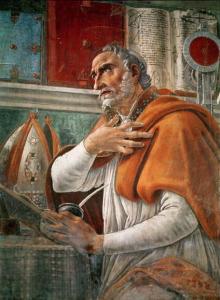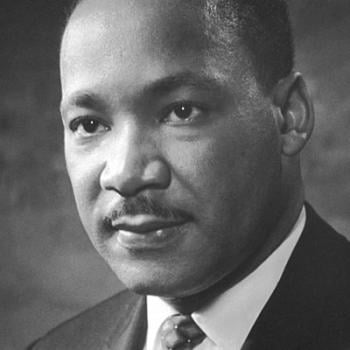
August 28, the feast of St. Augustine, was of course superseded by Sunday this year. The Gospel reading for this past Sunday gave many priests, including the one who filled in at my parish last Sunday morning, the occasion to talk about humility and pride. It’s appropriate to speak of this subject on St. Augustine’s memorial, because he shaped how we think about humility and pride in Western Christianity. It is in part thanks to Augustine that we think of pride as the greatest sin.
The lust for domination
Augustine of course wasn’t the first Christian to talk about pride and humility. It’s a basic theme in the New Testament and throughout Christian moral instruction. But Augustine offers particularly clear and powerful insights on the link between pride and domination of others. Augustine spoke of pride as the libido dominandi, the lust for domination. It was this lust, and not sexual lust, that Augustine believed to be the root of sin. (Augustine’s association of sexual desire with the desire to dominate was an accurate description of how Roman men of his culture thought of and experience sex, I think–and unfortunately it remains far too accurate today. But that is another post.)
For Augustine, our love is rightly ordered when we love God above all things and ourselves and our neighbors for the sake of God. Sin is a distortion of that right order. The sinner puts himself at the center and treats both God and other people as means to self-gratification and self-exaltation. But we can’t actually dominate God (though we can create false images of God in our minds and control those). We can, however, seek dominion over our neighbors.
Augustine saw the virtues of ancient pagan Romans as “splendid vices” because they were rooted in this lust for domination. Roman “virtue” consisted in behaving in such a way as to allow oneself (and compel others) to think of one as superior. It was a constant struggle for mastery over both oneself and others. Failure to achieve this mastery, whether because of one’s own failings or because of being overcome by someone else, was a justification for suicide. Hence Augustine described such paragons of Roman virtue as Regulus (who voluntarily allowed the Carthaginians to kill him rather than behave dishonorably) or Lucretia (who killed herself after being raped) as exemplars not of true virtue but of a disordered kind of “virtue” stemming from pride.
Living in the earthly city
Augustine’s City of God offers a radical critique of the Roman Empire as a gang of successful “robbers” who gilded their ruthless violence with claims of divine favor. For Augustine, this pattern runs throughout any “human city,” any community of sinful people who seek peace and order apart from submission to God. The only alternative is the city of God, the community of the redeemed held together by love rather than by force and domination.
Augustine describes the earthly city as rooted in the “love of self” and ultimately destined for destruction. So one would expect him to urge Christians to replace it with the true city, the “city of God.” But of course he does not do this. Rather, he argues that Christians must live within the earthly city, accepting its laws and working together with it insofar as its imperfect norms and structures serve “earthly peace” (City of God 19.17). This formulation has been, historically, the basis for Western Christendom. Christians have, following Augustine, struck a delicate balance between a criticism of the unjust power structures of “this world” and an acceptance of them as serving an imperfect but necessary earthly good.
One can praise this paradoxical stance as moderate and reasonable. It has certainly allowed Christians to do much good in the world, serving justice, creating works of culture, and learning from the best wisdom of non-Christian sources.
But on the other hand, it is a startling conclusion to reach given Augustine’s incendiary rhetoric about the corrupt basis and ultimate destruction of the earthly city. It’s as if he starts out heading in one place and then suddenly ends up in another. There’s a fundamental tension between his radical critique of the Roman social order (and all “merely human” and worldly orders) and his desire to lay the foundation for constructive Christian engagement with the societies in which they live.
Kinder, gentler domination
And as modern critics are quick to point out, Augustine writes from within a privileged social location as an educated Roman man in a position of power. He cultivated friendships with upper-class Roman Christians responsible for military and judicial functions within the beleaguered and crumbling structures of Roman Africa. He used these friendships to argue for mercy and justice. But he also wrote consistently from a perspective sympathetic with those who wielded power rather than those who writhed under it. One of his most chilling passages (City of God 19.6) imagines the terrible dilemma faced by a Christian judge who has to torture a confession out of a suspect of whose guilt he is uncertain. Augustine describes this situation as “a thing to be bewailed, and if it were possible, watered with fountains of tears.” But he affirms unhesitatingly that a Christian judge can and should take on this terrible responsibility. His ignorance regarding the suspect’s guilt is not a sin, and the method of judicial torture is the method by which the earthly society seeks to maintain justice. The true wickedness, for Augustine, would be to abandon this flawed, ignorant, miserable earthly order to its own devices.
The ideal Christian judge or ruler, for Augustine, is someone humbly aware of his own faults, moved by love for his subjects and even his enemies, and constantly moved by the misery of his situation to call on God’s mercy and seek God’s guidance. To have such rulers makes the earthly city happier and more peaceful. They work within the structures that have been established by sinful humans through self-love and the lust for power, yet by acting with right intentions they manage to avoid sin (at least some of the time–Augustine thought that no one could avoid sin altogether but he did not think that the actions of Christian magistrates were necessarily sinful even when they were harsh and coercive) and promote what is genuinely good in the earthly city.
We have sixteen centuries of such efforts to examine now. The story of “Western Civilization” is largely the story of the Augustinian project, with its delicate balance between idealism and pragmatism and its emphasis on the personal motivations of the powerful. And I think we are in a position to say that there is something fundamentally wrong with Augustine’s formulation. It’s not just that Augustine’s language can be abused by hypocrites who don’t seriously try to practice what Augustine taught, but that people who seriously do try to practice his teachings will often come up with mistaken, damaging, even horrific results.
Robert E. Lee, the Augustinian
Take, for instance, the case of Robert E. Lee’s views on slavery. Lee is often charitably misrepresented as opposing slavery. He certainly expressed disapproval of it in principle, but he also opposed immediate abolition. He saw it, as many white Southern Christians did, as an unfortunate necessity. (By the time of the Civil War this was a moderate, even liberal view, since more and more Southerners had come to argue for it as a positive good–this is why people have mistakenly represented Lee as an outright opponent.) But he argued that it was a greater evil for white people than for those they enslaved, and that it was actually a “painful discipline. . . necessary for their instruction as a race.”
It is of course possible to argue that Lee was simply a malicious hypocrite. And the tendency in progressive circles these days is to deny him practically any of the virtues that white Americans have traditionally ascribed to him. But even his fiercest critics acknowledge that his piety was sincere. And his attitude to slavery was better than Augustine’s inasmuch as he hoped for an end to slavery at some point within history, whereas Augustine seems to have expected it to last as long as the “city of man” did. But both Lee and Augustine saw the evil of slave-owning primarily in its moral effect on the owners. Both believed that slavery could be salutary for people of weak moral character. (Lee, unlike Augustine, applied this concept in broadly racial ways–one way in which his view was worse than Augustine’s, to be sure.)
Lee’s brutal whipping of Wesley Norris and two other slaves who had sought to escape was not some aberration of personal cruelty. Augustine had explicitly taught that Christian masters could and should whip slaves who disobeyed them, in order to “restore them to peace.” (See City of God 19.16, and also footnote 31 to this article by Matthew Elia.) For Augustine, such disciplinary action was actually an act of love.
This is just one particularly provocative example of a pattern we see repeated throughout Christian history–people of apparent good faith and personally upright character invoking the key elements of the Augustinian ethos to justify what we now recognize as tyrannical oppression. Fr. Junipero Serra’s treatment of indigenous people in California is another example–perhaps a better one since he was acting from altruistic motives whereas Lee’s actions, however sincere his belief in their justification, were highly self-serving.
Does humility point up or down?
Why is all this connected to humility? Because, for Augustine, the evil of pride and the virtue of humility consisted in placing oneself in one’s rightful place in a hierarchical order, under God and above the rest of creation, and for members of the elite (particularly men) also above women, children, slaves, and others whom providence had placed in a lower position. Augustine argues over and over again that only someone who is properly humble, properly submissive to God, can exercise true authority. Only such a person can be trusted to act charitably and gently (that is to say, with healthy severity but not excessive cruelty) toward those beneath him.
In Augustine’s narrative of the Fall, human beings rebel against God, the true master whose slaves we all are, and as a result lose control over creation and indeed over their own bodies. In Augustinian Western Christianity, to serve is to reign. But this doesn’t involve a radical rethinking of what it might mean to “reign” in the first place. Rather, the maxim means that those who serve God in humility can be entrusted with power over others, and for such people to exercise power is an act of service.
In a recent FB post, a friend of mine who writes under the name Beth Barrett made the excellent point that in Christian circles we have often spoken of forgiveness primarily as something that is exercised “upward”–toward, for instance, those who have authority over us and have abused us. But when someone proposes to forgive those who have less power–as in the recent student loan forgiveness program–many Christians object because they see this as disruptive of good order and encouraging of irresponsibility.
I think that the same can be said of humility. Augustine stresses the virtue of humility toward those “above” us–primarily God, but also human authorities. He believed–and I think he was utterly sincere in this–that such humility would make a person gentle and merciful toward those “below.” But the historical record indicates that this isn’t a very reliable result. Certainly not if we go by outward profession. We can always claim that people who are cruel toward those below them aren’t really humble toward God, but this smacks of “no true Scotsman.” And it evades the question of what counts as cruelty in the first place.
Called to freedom
At the same time, I don’t think we can simply throw out Augustine. There are many reasons why I value him, but on this specific point I think his understanding of pride and the role of the libido dominandi in human sinfulness is essential. But as on so many issues, it’s possible to use Augustine against Augustine.
If human sinfulness is rooted in pride and pride takes the form of domination, then our language about humility needs to be more sharply focused to root out that lust for domination under the pious disguises it loves to assume–including in Augustine himself.
What if, instead of seeking simply to be humble toward Divine Providence, Robert E. Lee had been humble toward Wesley Norris? What if he had been willing to acknowledge that Norris’ desire for freedom might be a salutary discipline of the Lord toward Robert E. Lee? What if Fr. Serra had mingled humility with charity in his attitude toward the indigenous Californians, and had entertained the possibility that his idea of what a godly and virtuous life looked like for them might need to be revised? What if in every interaction we have with someone less powerful than ourselves, we took the stance not simply of someone called to exercise charity and act for the other’s good but of someone willing to hear from the othe what that good might be?
This is why the set of concerns with power relationships often reviled by conservatives as “woke” is, in fact, both an extension and a correction of what Christians have historically affirmed about human sinfulness. (That does not mean that it is the whole truth on this or any other matter.) It should be no surprise to us to be told that there is something fundamentally wrong with us, and that this fundamental wrongness is connected to our domination of others. The emphasis on structures rather than individual motivations, while capable of being one-sided and inaccurate if taken on its own, is a healthy counterbalance to the long and devastating tendency of Christians to engage in oppressive actions and support unjust structures while claiming to be doing so in the right way or with the right motives and thus to be acting virtuously.
Christian moralists have never ceased to call us to see Christ in the poor and oppressed as an object of charity. But we need also to see Christ in them as an object of humility.
The city of God has lived long enough by the rules of the city of man, the rules of domination and oppression masquerading as “salutary discipline.” This is the true captivity to worldly values, and Christ is calling us to freedom.
Image: St. Augustine in Contemplative Prayer, by Sandro Botticelli.
|
The work of art depicted in this image and the reproduction thereof are in the public domain worldwide. The reproduction is part of a collection of reproductions compiled by The Yorck Project. The compilation copyright is held by Zenodot Verlagsgesellschaft mbH and licensed under the GNU Free Documentation License.
|












